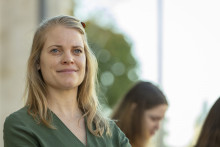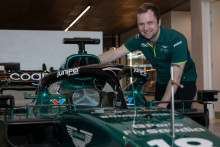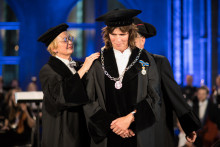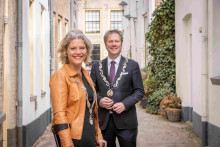The Hochschule für Philosophie is located smack in the middle of Munich’s student district. Philosopher Lieke Asma (34), who graduated at the UT in 2008, has been working at the institute since April of 2018. The fact that this school of philosophy was founded by Jesuits is still evident today, Asma says. ‘My boss is a monk too. The Jesuits live on the grounds and live by the rules of their order. Still, my boss is also a big jazz lover and can often be found in underground bars.’
Religion and science
Asma’s research project is sponsored by the Templeton Foundation, an organisation established by the wealthy American businessman John Templeton. His foundation focuses on the big questions in life, which are often situated on the cutting edge of religion and science. Over the course of the next three years, Asma will do research on self-development in Munich.
‘I know from experience that the combination of philosophy and religion can quickly lead to negative views,’ Asma says. ‘It is true that I work for the church. Yet the Hochschule also offers a comprehensive philosophy programme. The institute does not care about my personal beliefs. Many of my colleagues at my previous employer, VU Amsterdam, were also religious.’
Media
Asma obtained her doctoral degree at the VU with research into the topic of ‘free will’. Her doctoral thesis received attention from various media. The Volkskrant, Het Friesch Dagblad, Trouw and the Reformatorisch Dagblad all lined up for an interview. ‘The topic of free will clearly speaks to many people. Of course, I liked being in the papers and it is important for scientists to descend from their ivory tower every now and again. Yet the papers often want a big story: some put it as if my research was in defence of free will – even though my doctoral thesis, which I spent four years working on, was extremely specific in nature. That was difficult for me. On top of that, I am down to earth and not really interested in all that attention.’

Twente
Asma is from the town of Rossum in Twente, near Oldenzaal. ‘When I left for university, I heard of the UT’s media psychology programme, which appealed to me a lot. I also liked the green, small-scaled campus. Our class was the first of the UT’s psychology programme. We worked together closely with the lecturers and got to think along about the programme itself. We felt like pioneers. Eventually, I graduated in the field of neuroscientific research. At that time, roughly a decade ago, the common belief was that neuroscience would let us measure exactly what goes on in the brain. That knowledge was supposed to fully explain human behaviour by studying the brain.’
'In hindsight, the neuroscientific research was a disappointment for me.'
‘In hindsight, the neuroscientific research was a disappointment for me. Sure, we measured all kinds of brain activity, but we did not know how to interpret our findings. We were left with a lot of unanswered questions. The terminology we worked with – such as attitude or motivation – was poorly defined as well. No one knew what these terms really meant and there was no discussion about it. That was what led me to study philosophy in Nijmegen. Philosophy is about the nature of the things we measure in our research.’
Consciousness
After finishing her studies in Nijmegen, Asma began her doctoral research into free will at the VU. In her PhD thesis, she was critical of the research conducted by neuroscientists, who have been claiming since the 1980s that there is no such thing as free will. One of the most well-known among them is Benjamin Libet. In his tests, he has his subjects push a button. Libet then measures their brain activity. Prior to the intention to push the button, they already show some brain activity. Conclusion: our actions are determined by subconscious processes in our brain, not by our free will. According to these neuroscientists, this is proof of the fact that there is no such thing as conscious action and that the concept of free will is a myth as well.
According to Asma, the term ‘free will’ was defined incorrectly in Libet’s research. ‘Philosophers believe free will is based on reasons: it is about the deliberations a person makes. The neuroscientific tests were conducted in a setting in which people had no reasons, except to push a button. That setting kept the subjects from reflecting on their own actions.’

Impulses
‘Philosophers believe that actions based on reasons are a requirement of free will. We perform many of our standard rituals on autopilot. I get dressed in the morning, brew some coffee and brush my teeth. Although there is some brain activity involved in all that, they are all conscious actions. I have the intention of going to the University and therefore do these things for a reason. My brain activity does not preclude me from doing something with a conscious intention.’
Whereas neuroscientists look at the brain, psychologists focus on external influences. People are constantly affected by unconscious influences. The smell of bread makes us walk into a bakery and the middle shelf in a supermarket looks more appealing to us than the ones below it. These are all unconscious influences that psychologists believe reduce or even eliminate free will.
Asma acknowledges that our actions are affected by unconscious influences. ‘Yet that does not mean I do not have an intention. Suppose I want to go for a run and I have a cup of coffee before I go. The caffeine makes me run faster and therefore affects my behaviour, but my action – the running – is still something I do consciously.’
Society
The concept of free will helps us understand our actions, Asma states. ‘Free will is a fundamental aspect of how people treat each other. It is all well and good to claim that there is no such thing as free will and reduce everything to subconscious (brain) processes, but doing so goes against our very nature. There is simply a distinction between an accident and a deliberate action. If someone deliberately throws a drink in my face, that is something entirely different from the same thing happening by accident. These two things are fundamentally different, even if we cannot measure the difference in our brain.’
'Free will is a fundamental aspect of how people treat each other.'
Asma’s doctoral thesis was part of the Science beyond Scientism project that ran at the VU from 2013 until 2016. Scientism was the main focus of the research project. According to this belief, only (natural) science can lead to knowledge. ‘All explanations occur at the physical level. Of course, that results in a fair amount of scepticism when it comes to the existence of free will. I am not trying to defend free will in my doctoral thesis. All I am saying is that neuroscientific research has not provided any evidence to disprove the existence of free will.’
Asma will spend the next three years conducting research into self-development. ‘The project in Munich is based on a more positive principle. It is about the question of how to integrate psychological and philosophical models. These two fields of study each have their own terminology. That is unfortunate, because it inhibits their integration. In addition to philosophy, I also studied psychology. I hope to bridge the gap between both fields.’







